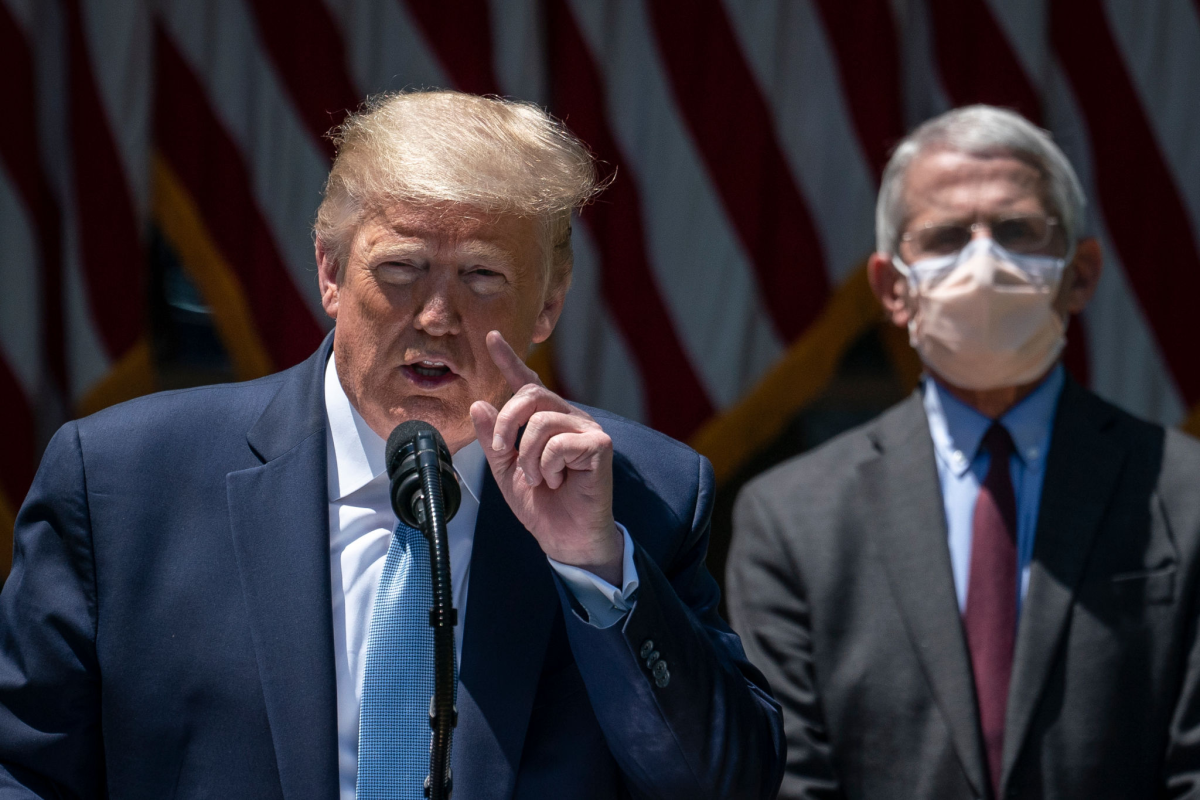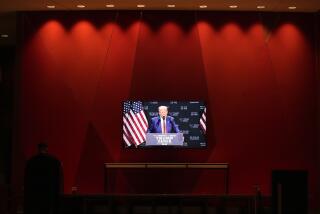Why did Trump lie about the threat of COVID-19 when he knew how serious it was?

- Share via
After revelations this week that President Trump knew all along COVID-19 was a serious threat, he wants us to believe he was acting in the public interest when he repeatedly minimized the pandemic’s dangers.
Tapes of his conversations with Bob Woodward for a new book, which were released this week, show that even as Trump was downplaying the dangers of the coronavirus in public, he recognized the gravity of the situation in private as early as February.
He knew the virus was transmitted through airborne particles, and told Woodward on Feb. 7: “This is deadly stuff.” He got that right. So far, COVID has claimed nearly 200,000 American lives.
And yet in public, he said repeatedly that COVID was less serious than the flu, that more Americans would die by suicide as a result of the economic shutdown than from the virus, that it would disappear when the weather warmed up.
“Why did you lie to the American people, and why should we trust what you have to say now?” ABC’s Jonathan Karl asked Trump at a White House press conference on Thursday.
“Such a terrible question,” replied the president. “I didn’t lie. What I said is we have to be calm, we can’t be panicked.”
Such a terrible answer. He did lie, does lie and he continues to lie.
“The job we’ve done is the best job,” he said, sounding like a parody of a parody of self-aggrandizing Trumpian syntax.
As many have pointed out, Trump has had no problem trying to work his base into a frenzy with lies about nonexistent threats (antifa, immigrant caravans), but when it comes to real threats such as COVID-19, which has wrought untold harm on so many of us, he downplays them and lies. Why? Because the truth would do nothing to boost support for his reelection.
And anyway, as Trump told reporters Thursday, “if Bob Woodward thought what I said was bad, he should have immediately gone out to the authorities.”
Leaving aside the mind-boggling proposition that Trump doesn’t consider himself the authority in this scenario, it is a bit puzzling that Woodward sat on such explosive information for so many months. You could argue that if Woodward had blown the whistle sooner, lives might have been saved.
Woodward has defended himself by saying he’s not in the daily news business anymore; he’s in the book business, and he knew his new Trump book “Rage” would be out before the November election.
On the ethics-and-morality front, this doesn’t really cut it.
But Woodward has never been one to fret about abstract concepts such as that. He cultivates political insiders and writes down what they tell him. It’s a formula that has worked spectacularly well; he’s written or co-written 18 books. All have been best sellers.
His technique is not without its critics.
As Joan Didion wrote years ago in the New York Review of Books, “Mr. Woodward’s rather eerie aversion to engaging the ramifications of what people say to him has been generally understood as an admirable quality … the entirely justifiable oversight of someone with a more important game to play.”
Didion wasn’t buying it.
“These are books,” she concluded, “in which measurable cerebral activity is virtually absent.”
::
What if Trump had told us the truth about COVID when he knew it?
Would a public, already accustomed to his self-serving, truth-stretching ways, have really believed him?
Last week, the conservative pundit Erick Erickson tweeted a creative defense of Trump’s mendacity: “FACT,” Erickson wrote, “some of you will be enraged by, but it’s FACT: If Trump had raised the alarm aggressively about the virus in early February, Democrats and much of the media would have claimed he was trying to distract from the impeachment. You can deny it all you want, but it is true.”
Leaving aside the absurdity of labeling what is clearly conjecture as “fact,” could Erickson have a point?
Are we so primed by Trump’s incessant lying that we can’t take anything he says at face value?
Blaming Democrats for Trump’s dishonesty might be a fun exercise for Republicans, but it’s specious. The assertion that Trump lied about COVID to avoid being accused of distracting from his impeachment simply doesn’t hold up.
Trump was acquitted by the Senate on Feb. 5.
On Feb. 6, he gave a celebratory speech in the East Room of the White House before an audience of senior officials and family that one publication described as “triumphalist, mocking, vitriolic and vulgar.”
On Feb. 7, he privately told Woodward the virus was airborne and deadly.
And despite that, he held six indoor rallies over the next few weeks, with no social distancing measures required.
Trump did not lie about COVID because he feared he would panic Americans.
He lied about COVID for entirely selfish reasons. He knew he was not capable of handling a national catastrophe, and he needed those rallies for his ego.
His need to be venerated far outweighs his concern for the lives of his supporters, or anyone else.
More to Read
A cure for the common opinion
Get thought-provoking perspectives with our weekly newsletter.
You may occasionally receive promotional content from the Los Angeles Times.










